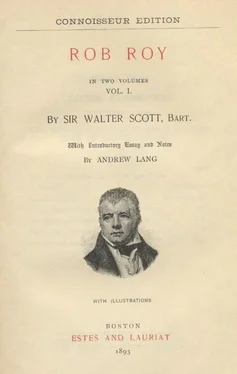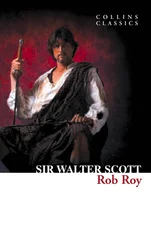Walter Scott - Rob Roy
Здесь есть возможность читать онлайн «Walter Scott - Rob Roy» — ознакомительный отрывок электронной книги совершенно бесплатно, а после прочтения отрывка купить полную версию. В некоторых случаях можно слушать аудио, скачать через торрент в формате fb2 и присутствует краткое содержание. Год выпуска: 2004, Жанр: Исторические приключения, на английском языке. Описание произведения, (предисловие) а так же отзывы посетителей доступны на портале библиотеки ЛибКат.
- Название:Rob Roy
- Автор:
- Жанр:
- Год:2004
- ISBN:нет данных
- Рейтинг книги:5 / 5. Голосов: 1
-
Избранное:Добавить в избранное
- Отзывы:
-
Ваша оценка:
- 100
- 1
- 2
- 3
- 4
- 5
Rob Roy: краткое содержание, описание и аннотация
Предлагаем к чтению аннотацию, описание, краткое содержание или предисловие (зависит от того, что написал сам автор книги «Rob Roy»). Если вы не нашли необходимую информацию о книге — напишите в комментариях, мы постараемся отыскать её.
Rob Roy — читать онлайн ознакомительный отрывок
Ниже представлен текст книги, разбитый по страницам. Система сохранения места последней прочитанной страницы, позволяет с удобством читать онлайн бесплатно книгу «Rob Roy», без необходимости каждый раз заново искать на чём Вы остановились. Поставьте закладку, и сможете в любой момент перейти на страницу, на которой закончили чтение.
Интервал:
Закладка:
He chanced to be in company with Rob Roy, who, either in contempt of Boquhan's supposed effeminacy, or because he thought him a safe person to fix a quarrel on (a point which Rob's enemies alleged he was wont to consider), insulted him so grossly that a challenge passed between them. The goodwife of the clachan had hidden Cunningham's sword, and while he rummaged the house in quest of his own or some other, Rob Roy went to the Shieling Hill, the appointed place of combat, and paraded there with great majesty, waiting for his antagonist. In the meantime, Cunningham had rummaged out an old sword, and, entering the ground of contest in all haste, rushed on the outlaw with such unexpected fury that he fairly drove him off the field, nor did he show himself in the village again for some time. Mr. MacGregor Stirling has a softened account of this anecdote in his new edition of Nimmo's Stirlingshire; still he records Rob Roy's discomfiture.
Occasionally Rob Roy suffered disasters, and incurred great personal danger. On one remarkable occasion he was saved by the coolness of his lieutenant, Macanaleister or Fletcher, the Little John of his band—a fine active fellow, of course, and celebrated as a marksman. It happened that MacGregor and his party had been surprised and dispersed by a superior force of horse and foot, and the word was given to "split and squander." Each shifted for himself, but a bold dragoon attached himself to pursuit of Rob, and overtaking him, struck at him with his broadsword. A plate of iron in his bonnet saved the MacGregor from being cut down to the teeth; but the blow was heavy enough to bear him to the ground, crying as he fell, "Oh, Macanaleister, is there naething in her?" ( i.e. in the gun). The trooper, at the same time, exclaiming, "D—n ye, your mother never wrought your night-cap!" had his arm raised for a second blow, when Macanaleister fired, and the ball pierced the dragoon's heart.
Such as he was, Rob Roy's progress in his occupation is thus described by a gentleman of sense and talent, who resided within the circle of his predatory wars, had probably felt their effects, and speaks of them, as might be expected, with little of the forbearance with which, from their peculiar and romantic character, they are now regarded.
"This man (Rob Roy MacGregor) was a person of sagacity, and neither wanted stratagem nor address; and having abandoned himself to all licentiousness, set himself at the head of all the loose, vagrant, and desperate people of that clan, in the west end of Perth and Stirling shires, and infested those whole countries with thefts, robberies, and depredations. Very few who lived within his reach (that is, within the distance of a nocturnal expedition) could promise to themselves security, either for their persons or effects, without subjecting themselves to pay him a heavy and shameful tax of black-mail. He at last proceeded to such a degree of audaciousness that he committed robberies, raised contributions, and resented quarrels, at the head of a very considerable body of armed men, in open day, and in the face of the government." [4] Mr. Grahame of Gartmore's Causes of the Disturbances in the Highlands. See Jamieson's edition of Burt's Letters from the North of Scotland, Appendix, vol. ii. p. 348.
The extent and success of these depredations cannot be surprising, when we consider that the scene of them was laid in a country where the general law was neither enforced nor respected.
Having recorded that the general habit of cattle-stealing had blinded even those of the better classes to the infamy of the practice, and that as men's property consisted entirely in herds, it was rendered in the highest degree precarious, Mr. Grahame adds—
"On these accounts there is no culture of ground, no improvement of pastures, and from the same reasons, no manufactures, no trade; in short, no industry. The people are extremely prolific, and therefore so numerous, that there is not business in that country, according to its present order and economy, for the one-half of them. Every place is full of idle people, accustomed to arms, and lazy in everything but rapines and depredations. As buddel or aquavitae houses are to be found everywhere through the country, so in these they saunter away their time, and frequently consume there the returns of their illegal purchases. Here the laws have never been executed, nor the authority of the magistrate ever established. Here the officer of the law neither dare nor can execute his duty, and several places are about thirty miles from lawful persons. In short, here is no order, no authority, no government."
The period of the rebellion, 1715, approached soon after Rob Roy had attained celebrity. His Jacobite partialities were now placed in opposition to his sense of the obligations which he owed to the indirect protection of the Duke of Argyle. But the desire of "drowning his sounding steps amid the din of general war" induced him to join the forces of the Earl of Mar, although his patron the Duke of Argyle was at the head of the army opposed to the Highland insurgents.
The MacGregors, a large sept of them at least, that of Ciar Mhor, on this occasion were not commanded by Rob Roy, but by his nephew already mentioned, Gregor MacGregor, otherwise called James Grahame of Glengyle, and still better remembered by the Gaelic epithet of Ghlune Dhu, i.e. Black Knee, from a black spot on one of his knees, which his Highland garb rendered visible. There can be no question, however, that being then very young, Glengyle must have acted on most occasions by the advice and direction of so experienced a leader as his uncle.
The MacGregors assembled in numbers at that period, and began even to threaten the Lowlands towards the lower extremity of Loch Lomond. They suddenly seized all the boats which were upon the lake, and, probably with a view to some enterprise of their own, drew them overland to Inversnaid, in order to intercept the progress of a large body of west-country whigs who were in arms for the government, and moving in that direction.
The whigs made an excursion for the recovery of the boats. Their forces consisted of volunteers from Paisley, Kilpatrick, and elsewhere, who, with the assistance of a body of seamen, were towed up the river Leven in long-boats belonging to the ships of war then lying in the Clyde. At Luss they were joined by the forces of Sir Humphrey Colquhoun, and James Grant, his son-in-law, with their followers, attired in the Highland dress of the period, which is picturesquely described. [5] "At night they arrived at Luss, where they were joined by Sir Humphrey Colquhoun of Luss, and James Grant of Plascander, his son-in-law, followed by forty or fifty stately fellows in their short hose and belted plaids, armed each of them with a well-fixed gun on his shoulder, a strong handsome target, with a sharp-pointed steel of above half an ell in length screwed into the navel of it, on his left arm, a sturdy claymore by his side, and a pistol or two, with a dirk and knife, in his belt."—Rae's History of the Rebellion, 4to, p. 287.
The whole party crossed to Craig-Royston, but the MacGregors did not offer combat.
If we are to believe the account of the expedition given by the historian Rae, they leapt on shore at Craig-Royston with the utmost intrepidity, no enemy appearing to oppose them, and by the noise of their drums, which they beat incessantly, and the discharge of their artillery and small arms, terrified the MacGregors, whom they appear never to have seen, out of their fastnesses, and caused them to fly in a panic to the general camp of the Highlanders at Strath-Fillan. C Note C.—The Loch Lomond Expedition. The Loch Lomond expedition was judged worthy to form a separate pamphlet, which I have not seen; but, as quoted by the historian Rae, it must be delectable. "On the morrow, being Thursday the 13th, they went on their expedition, and about noon came to Inversnaid, the place of danger, where the Paisley men and those of Dumbarton, and several of the other companies, to the number of an hundred men, with the greatest intrepidity leapt on shore, got up to the top of the mountains, and stood a considerable time, beating their drums all the while; but no enemy appearing, they went in quest of their boats, which the rebels had seized, and having casually lighted on some ropes and oars hid among the shrubs, at length they found the boats drawn up a good way on the land, which they hurled down to the loch. Such of them as were not damaged they carried off with them, and such as were, they sank and hewed to pieces. That same night they returned to Luss, and thence next day to Dumbarton, from whence they had at first set out, bringing along with them the whole boats they found in their way on either side of the loch, and in the creeks of the isles, and mooring them under the cannon of the castle. During this expedition, the pinnaces discharging their patararoes, and the men their small-arms, made such a thundering noise, through the multiplied rebounding echoes of the vast mountains on both sides of the loch, that the MacGregors were cowed and frighted away to the rest of the rebels who were encamped at Strath Fillan."— Rae's History of the Rebellion, 4to, p. 287.
The low-country men succeeded in getting possession of the boats at a great expenditure of noise and courage, and little risk of danger.
Интервал:
Закладка:
Похожие книги на «Rob Roy»
Представляем Вашему вниманию похожие книги на «Rob Roy» списком для выбора. Мы отобрали схожую по названию и смыслу литературу в надежде предоставить читателям больше вариантов отыскать новые, интересные, ещё непрочитанные произведения.
Обсуждение, отзывы о книге «Rob Roy» и просто собственные мнения читателей. Оставьте ваши комментарии, напишите, что Вы думаете о произведении, его смысле или главных героях. Укажите что конкретно понравилось, а что нет, и почему Вы так считаете.









